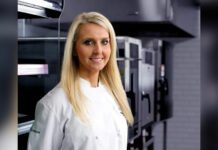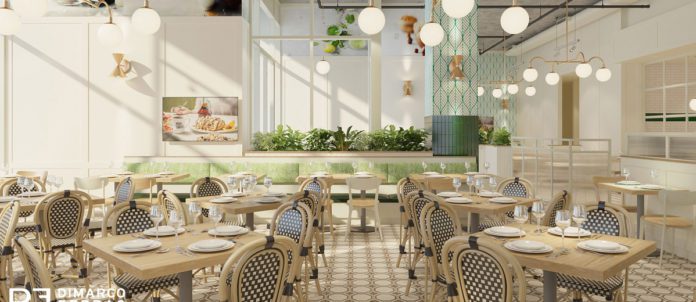Ritou Maloni knows you can’t be all things to all people. The co-founder of the Quebec-based breakfast chain Pur & Simple says while her corporate team is great at selling its brand, operating a restaurant requires a completely different skillset.
“We’re very strong franchisors,” she says. “We’re great at brand building and we’re great at selling, but operating a restaurant is a completely different business model than franchising and sometimes you can’t do both. You can’t be everything to everybody.”
So, with the brand gaining traction with investors, Pur & Simple’s parent company, Eat It! Brands, made the decision to “focus on what we’re great at, which is supporting our franchise partners, giving them a winning business model and growing the brand across Canada,” says Maloni.
Pur & Simple currently boasts 35 units in Canada — all of them are franchised — with 15 more under development. The breakfast chain spreads coast to coast, with 13 locations in Atlantic Canada, one in Quebec, nine in Ontario, one in Alberta and three in B.C. The brand has its sights set on Atlantic Canada for future expansion, followed by five new openings in Ontario.
“We’re trying to find great franchise partners and once we find those, we give them the best opportunity for success in the geographic location they’re interested in,” says Maloni, adding the Atlantic provinces are attractive for expansion because of the lack of competition in the breakfast space.
“Our head office is in Quebec and there’s so much competition here — every second corner has a breakfast place. But when I travelled out east, there was nothing there. You have Cora’s and that was it, so we saw an opportunity there,” she says, adding when Pur & Simple opened its first location in Atlantic Canada, “there was a lineup out the door and we had no idea how to serve the amount of people; we weren’t expecting it.”
While COVID-related lockdowns and permitting delays have caused some new openings to be pushed back, Pur & Simple is planning an opening per month for the next 12 months and have another 10 Ontario locations sold along with a unit in Burnaby, B.C.
She says the brand has had a lot of franchise partners sign deals and now the challenge becomes finding the right real estate.
“Our perfect spot is an endcap or a standalone building and our sweet spot is about 3,200 sq. ft. with between 100 and 120 seats. But it feels like there’s not that much real estate available, so we’re trying not to be too picky.”
She says the brand also does best in highly residential areas. “More than 50 per cent of our business is done on the weekends, so we need a good density of residential around us. And then the businesses from Monday to Friday just gives us that extra lunchtime clientele. We’re looking at smaller markets — we would like to be a big fish in a small pond.”
To join the Pur & Simple family, potential franchise partners need approximately $300,000 of unencumbered cash. The turnkey cost of a restaurant ranges from $700,000 to $850,000. Certain factors, such as local labour, material cost, legal requirements, condition of the space to be leased and a landlord’s contribution towards leasehold improvements will determine the final cost. The initial franchise fee is $35,000 and a royalty fee of five-per-cent of gross sales is paid weekly.
“We need hands-on operators, somebody that’s ready to work in their business and willing to build that loyalty,” says Maloni. “Yes, they need enough financial backing to be able to sustain during hard times — we’ve learned this the hard way during COVID — but they also need a passion for hospitality, need to be eager and hungry. We want that person that, during a snowstorm is going to wake up at 4 a.m., shovel themselves out and make sure they can get to the restaurant to serve their guests.”
She says the ideal franchise partner also understands local marketing and the importance of being involved in their community.
Maloni says even during the challenges of the pandemic, Pur & Simple never backed down from its commitment to growth.
“We knew we had an amazing business model and we knew that once the dust settled and dine-in re-opened, we were going to do really well. We had a lot of deals signed pre-COVID and a lot of our franchise partners did not want to stop the evolution because they believed in the brand enough to even say, ‘we’re going to open up even during a lockdown where there’s takeout and delivery.”
She adds that in some deals, “we didn’t have a choice but to keep going. Landlords weren’t as understanding as we needed them to be so a lot of the times we opened [new units] for takeout only.”
As a result, Pur & Simple built a new business model based around takeout and delivery for breakfast. “When the pandemic started, less than one per cent of our sales were in takeout and delivery — now it’s over 30 per cent. It’s become a new revenue stream and is added to the sales once we re-open.”
With national expansion well in hand, Maloni says Pur & Simple is not ruling out international growth.
“We would love to [open international units], but we want to ensure we grow properly. The goal would be to expand in the U.S. and other opportunities internationally; we just want to make sure our franchise partners are well supported. We’ve hired two new training and operations consultants, a director of Marketing, a director of Operations and a director of Procurement to support our franchise partners because we’re not going anywhere. Our franchise partners have invested all their hard-earned money into us and now we have to show them that, pandemic or no pandemic, we’re not going anywhere.”
By Amy Bostock


















